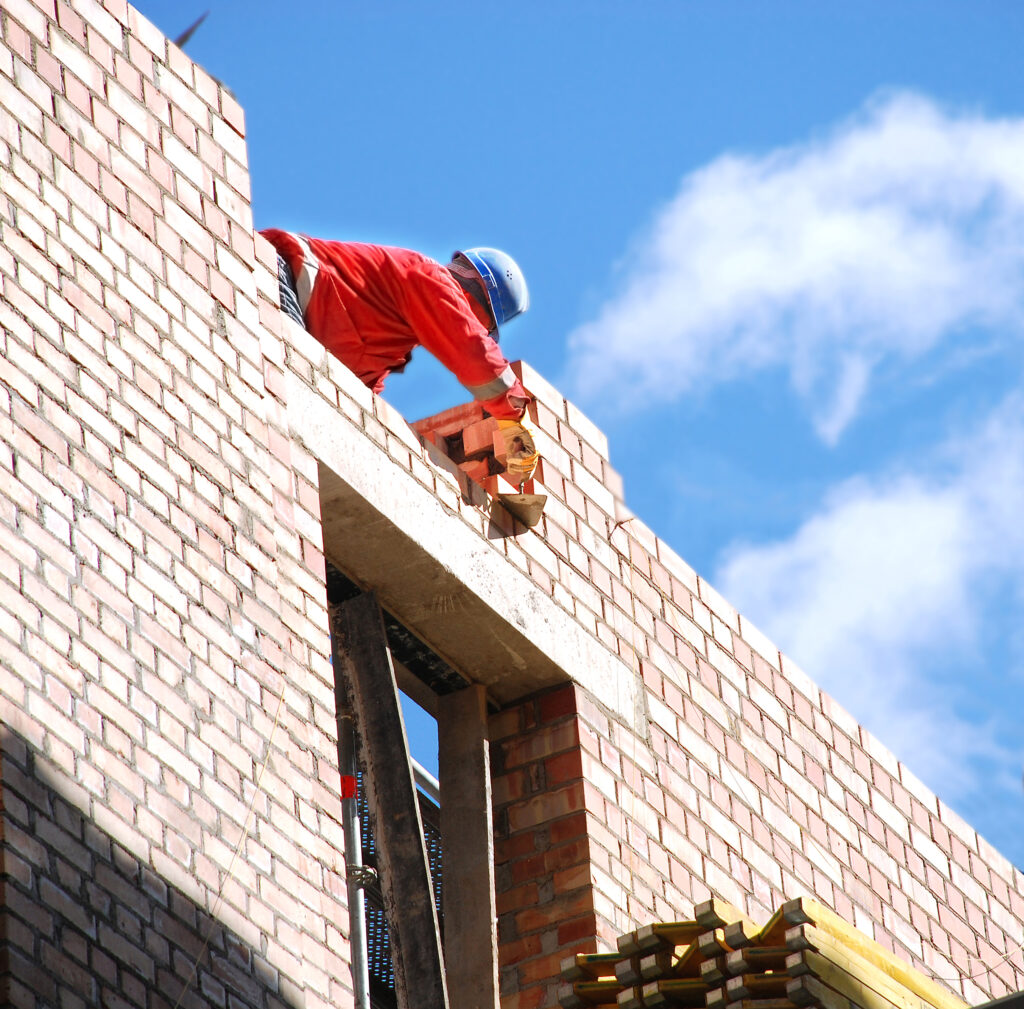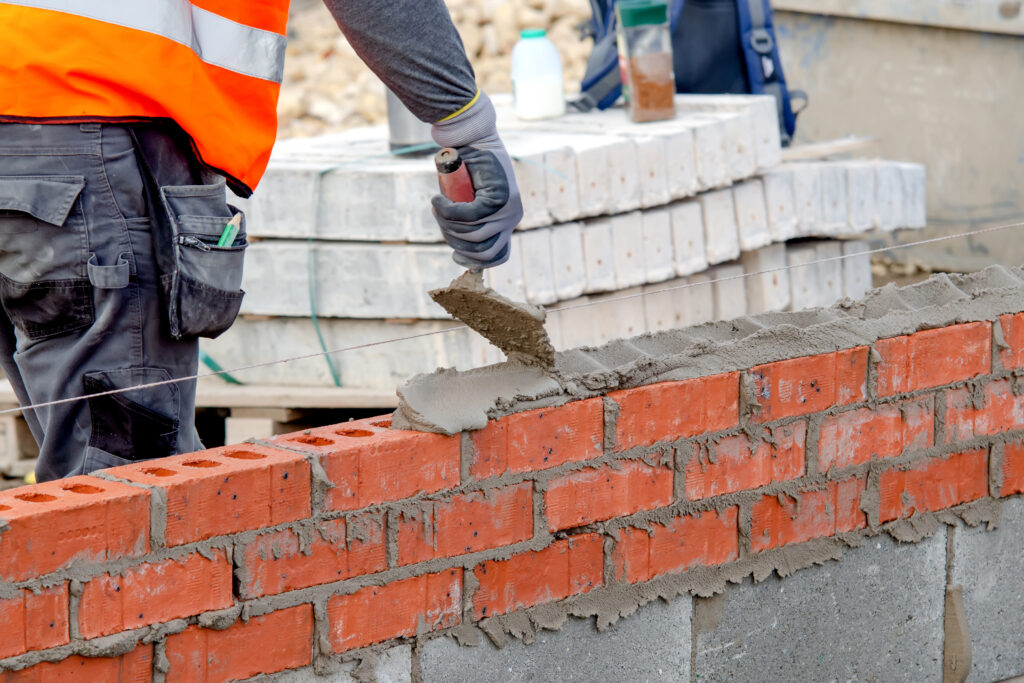Mortar Admixture for Residential Masonry
Mortar Admixtures for Residential Masonry Brick, Block, Stone Construction
Residential masonry construction involves the use of brick, block, and stone materials to build structures such as walls, chimneys, fireplaces, and other decorative features.
Types of Masonry Work
- Facade masonry work is the use of masonry materials for aesthetic purposes. This type of work involves applying brick, rock, or other decorative materials to the exterior of a building to improve its appearance. Facade masonry work does not support the structure of the building and typically uses mortar with lower compressive strength.
- Structural masonry work involves the use of brick, block or other masonry materials to support the weight of a building or structure, or create load-bearing walls, foundations or other structural elements of a building. Structural masonry work requires mortar with higher compressive strength and durability.
Mortar Admixture Types (ASTM)
When it comes to residential masonry construction, the use of proper mortar admixtures is essential. Whether you’re building with bricks, blocks or stones, choosing the right admixture can enhance the strength and durability of your construction.
There are several types of mortar admixtures available for residential masonry construction, as classified by ASTM. These include air-entraining admixtures, water-reducing admixtures, and waterproofing admixtures, among others.
Each type has its own specific use and benefits. For example, air-entraining admixtures are used to increase freeze-thaw durability and workability, while water-reducing admixtures reduce water demand and increase compressive strength. Accelerating admixtures speed up the setting time of the mortar, which is useful in cold weather conditions or for quick-turnaround projects. Bonding admixtures improve the bond between the mortar and masonry units, resulting in stronger walls and other structural elements.
By using the right mortar admixtures, masons can ensure that their residential masonry projects are strong, durable, and long-lasting.
Types of Joints and Mortar for Brick, Block, and Stone Construction
Before selecting an admixture, it’s important to understand which type is most suitable for your project.
Types of Joints
Joints are essential in masonry work, as they help to create a seal between units and improve the overall strength and durability of the structure. Some different types of joints include raked joints, concave joints, V joints, and weathered joints. Raked joints involve removing some of the mortar to create a recessed groove. Concave joints, on the other hand, involve shaping the mortar into a concave curve. V joints involve shaping the mortar into a V shape, while weathered joints are used to direct water away from the structure.
Types of Mortar
- Type M mortar is the strongest and is used for structural masonry work.
- Type S mortar is used for structural masonry work that is exposed to severe weather conditions.
- Type N mortar is commonly used for non-load-bearing structures and is suitable for most masonry work.
- Type O mortar is the weakest and is only suitable for interior non-load-bearing structures.
Building with Bricks
Brick is a popular material for residential masonry construction, due to its versatility and aesthetic appeal. When building with bricks, there are several types of joints and mortar to consider. The most common types of joints include flush, weathered, and concave, each with their own unique benefits. Mortar can also vary in its strength and composition, with Type N being a common choice for brick construction.
Building with Stone
Building with stone is another popular option for residential masonry construction. When building with stone, joints can be either dry-stack or mortared. Dry-stack joints are used for natural stone construction and rely on the weight of the stones to hold them in place. Mortared joints, on the other hand, require mortar to hold the stones in place. Type S mortar is a popular choice for stone construction due to its high strength and durability.
Building with Blocks
Blocks are commonly used in residential masonry construction for their cost-effectiveness and ease of use. When building with blocks, joints can be either flush or struck, with flush being the most common choice. Mortar type is also important for block construction, with Type M being a popular choice for its high compressive strength and ability to handle heavy loads.
Choosing the right mortar admixture is key to enhancing the strength, durability, and overall appearance of your residential masonry construction. By understanding the types of admixtures available and the types of joints and mortar for your specific material, you can ensure a successful construction project.
 EdenCrete® Mortar Admixture - Create millions of flexible, durable carbon bridges with a cutting-edge mortar admixture. Improve workability/consistency and helps to maintain water content.
EdenCrete® Mortar Admixture - Create millions of flexible, durable carbon bridges with a cutting-edge mortar admixture. Improve workability/consistency and helps to maintain water content.  Mortar Admixtures: Commercial Masonry - Mortar admixtures reduces shrinkage, cracking, efflorescence & permeability while increasing strength and durability of hardened mortar in commercial buildings.
Mortar Admixtures: Commercial Masonry - Mortar admixtures reduces shrinkage, cracking, efflorescence & permeability while increasing strength and durability of hardened mortar in commercial buildings.  Mortar Additive for Residential Masonry - Mortar admixtures increase durability & strength, reduce cracking, shrinkage, efflorescence & permeability. Instant quality improvements for very little cost. Learn more.
Mortar Additive for Residential Masonry - Mortar admixtures increase durability & strength, reduce cracking, shrinkage, efflorescence & permeability. Instant quality improvements for very little cost. Learn more.
- Concrete Admixtures | EdenCrete® - See how Concrete Admixtures compare…
- EdenCrete® Cement Admixture - Reduce abrasion, cracking, permeability, scaling,…
- Cement Admixtures | EdenCrete® - We have compiled summaries on…
- EdenCrete® Shotcrete Admixture - Reduce overspray, improve flow &…
- EdenCrete® Concrete Admixture - Create millions of flexible, durable…
 EdenCrete® Shotcrete Admixtures - Eden Innovations reviews various shotcrete…
EdenCrete® Shotcrete Admixtures - Eden Innovations reviews various shotcrete…  Shotcrete Admixtures used by Department of Transportation DOT - Shotcrete admixtures used by State…
Shotcrete Admixtures used by Department of Transportation DOT - Shotcrete admixtures used by State…  Cement Admixtures for Swimming Pools - Admixtures used with concrete &…
Cement Admixtures for Swimming Pools - Admixtures used with concrete &…  Concrete Admixture Types - Company and product application summaries…
Concrete Admixture Types - Company and product application summaries…
Contact Us
Social Media
Related Videos
Popular Articles

